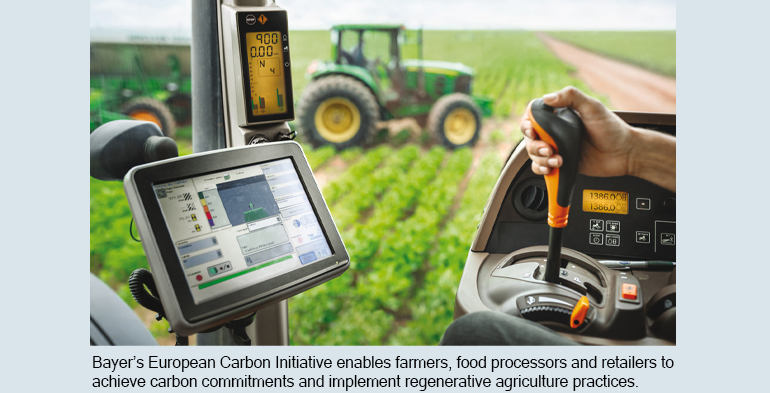
Bayer’s European Carbon Initiative enables farmers, food processors and retailers to achieve carbon commitments and implement regenerative agriculture practices. By 2025, Bayer expects to significantly increase the number of food and ag value chain projects and the number of participating farmers/Trinity Agtech’s Sandy platform delivers a trusted and distinctive natural capital navigation capability for carbon and sustainability impact management and supports farmers in managing their environmental sustainability, their profitability and their business resilience-all aligned with the latest Intergovernmental Panel on Climate Change (IPCC) methodology and compliant with international reporting and accounting standards
Monheim, Germany, March 21, 2024 – Bayer today announced a partnership with UK-headquartered company Trinity Agtech. As part of Bayer’s efforts to drive regenerative agriculture, Trinity Agtech’s platform Sandy will be instrumental for Bayer’s Carbon Initiative in the region EMEA in measuring and monitoring carbon on a farm level. Furthermore, the cooperation will enable the customized development of Bayer’s solutions to value chain players needs and growers based on Trinity’s capabilities. Leveraging science, digital and agronomical strengths on both ends the result is a unique regenerative agriculture ecosystem, developing high quality assets for a market that needs to be committed to tangible and credible outcomes.
The European Carbon Initiative is vital to Bayer’s overall strategy to shape regenerative agriculture. This includes making agriculture more productive and resilient while restoring natural resources. Started off in 2021, the Carbon Initiative now includes multiple tailored projects with large companies from the food supply and agricultural value chain. Today, farmers across several European countries and companies across the Food and Farming supply chain are working alongside with these partners to reduce carbon emissions and sequester carbon in the soil. Project results show that growers that are using regenerative practices are emitting on average 15 percent less carbon than conventional farmers. By 2025, Bayer expects to significantly increase the number of food and ag value chain projects and the number of farmers participating in value chain programs as the European Carbon Initiative is going to switch from pilot phase to scale-up phase for commercial projects.
To support these goals, reliable monitoring, reporting and verification (MRV) is key for all players of the food value chain to be compliant with third parties, global guidelines, certification bodies and regulatory requirements. With Sandy, Trinity Agtech has developed a new generation, trusted and easy-to-use cloud-based platform where farmers and project developers will bring all their data into one place to create a fact-based and primary data driven register of a farm’s natural capital. This allows the farmer to assess the farm’s carbon balance and options going forward.
“Our collaboration with Trinity offers many benefits for farmers and for our partners in the food value chain that want to deliver against their carbon reduction commitments and want to support regenerative practices in agriculture,” said Lionnel Alexandre, Carbon Business Venture Lead for Europe, Middle East and Africa at Bayer’s Crop Science Division. “We need reliable measuring technology and data analysis to verify carbon reductions and carbon sequestration on the farms. Trinity contributes with its state-of-the-art platform that is acknowledged by many experts around the globe.”
Working with internationally approved models to ensure accuracy
Trinity's models and analytical frameworks are nationally and internationally compliant with the IPCC standards and other key global guidelines, such as the GHG-P, in addition to previous verification against ISO 14.064 and 14.067 methodologies. Trinity Agtech’s distinctive scientific board contains leading international experts to ensure the most accurate possible assessment for the farmer with the available data. A recent study commissioned by the UK Department for Environment, Food & Rural Affairs (DEFRA) across 81 carbon calculators has placed Trinity’s software Sandy on the first rank in assessing farm carbon footprints and natural capital.
“We’re proud of Bayer’s commitment to credible and trusted sustainability analytics and their power in advancing the prosperity and environmental progress of the Food and Farming supply chain. Trinity is delighted to be Bayer’s analytical partner of choice in this vital program,” said Dr Hosein Khajeh-Hosseiny, Founder and Executive Chairman at Trinity.
All digital and cloud-based solutions from Bayer and its partners meet or exceed global data privacy requirements and provide data storage in the world’s most trusted cloud environments with leading security offerings. Most importantly, farmers own and control their farm data. They decide on what they share and what data they make available.
Approach to regenerative agriculture is driving food system resilience
One of Bayer’s strategic priorities is to help shape regenerative agriculture by investing in innovations that increase food production, farm incomes and climate resilience, while also protecting and restoring nature. In line with the political objectives of the E Green Deal, Bayer is working on the decarbonization of the food value chain focusing on farmers’ activities and connecting them with companies from the food value chain. The idea is to reward growers for adopting regenerative agriculture practices like using cover crops, tillage reduction, crop rotations and precision nitrogen application. These activities sequester carbon in the soil while improving soil health, resilience and productivity as well as limiting emissions. Digital technologies are important enablers for these endeavors.
More information on Bayer’s approach to regenerative agriculture can be found on the internet.